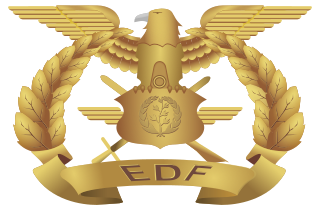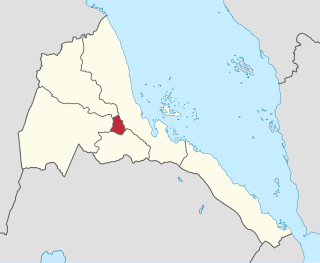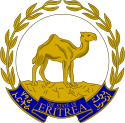
The Eritrean Defence Forces (EDF) are the combined military forces of Eritrea composed of three branches: Eritrean Army, Eritrean Air Force and Eritrean Navy. The Army is by far the largest, followed by the Air Force and Navy. The Commander-in-Chief of the EDF is the President of Eritrea. Their military role stems from Eritrea's strategic geographical location, located on the Red Sea with a foothold on the Bab-el-Mandeb strait.

The foreign relations of Eritrea are the policies of the Eritrean government by which it administers its external relations with other nations. Since its independence, Eritrea's foreign relations have been dominated by conflict and confrontation, both in the regional and international arenas. It has maintained often troubled, and usually violent, relations with its neighbors, including brief armed conflicts with Yemen and Djibouti and a destructive war with its bigger-neighbour, Ethiopia. At present, Eritrea has very tense relations with neighboring Ethiopia and Djibouti. Relations in the international arena also have been strained since the last decade, particularly with major powers. What appeared cordial relations with the US in the 1990s turned acrimonious following the border war with Ethiopia, 1998-2000. Although the two nations have a close working relationship regarding the ongoing war on terror, there has been a growing tension in other areas. Ties with international organizations such as the United Nations, the African Union, and the European Union have also been complicated in part because of Eritrea's outrage at their reluctance to force Ethiopia to accept a boundary commission ruling issued in 2002.

The Guatemalan Armed Forces consists of the National Army of Guatemala, the Guatemalan National Defense Navy, the Guatemalan Air Force, and the Presidential Honor Guard.

The Nigerian Armed Forces (NAF) are the military forces of Nigeria. The armed forces consists of three service branches: the Nigerian Army, Nigerian Navy, and Nigerian Air Force. The President of Nigeria functions as the commander-in-chief of the armed forces, exercising his constitutional authority through the Ministry of Defence, which is responsible for the management of the military and its personnel. The operational head of the AFN is the Chief of Defence Staff, who is subordinate to the Nigerian Defence Minister. With a force of more than 230,000 active personnel, the Nigerian military is one of the largest uniformed combat services in Africa. According to Global Firepower, the Nigerian Armed Forces are the fourth-most powerful military in Africa, and ranked 35th on its list, internationally.

The Armed Forces of the Republic of Uzbekistan, is the name of the unified armed forces of Uzbekistan, consisting of the Ground Force and the Air and Air Defence forces under the defence ministry. Paramilitary units include the National Guard, a Frontier Service and a River Force. It is reported to be the largest, and the strongest in Central Asia. 'The country [has] also began professionalizing its military, an effort that has only limited success and erratic government support. But even in Uzbekistan, these changes represent merely a modest beginning and most of the benefits are concentrated in a few elite, higher readiness formations rather than uniformly applied to the entire force. The Uzbek military is woefully inadequate, but it is far superior to its neighbours.'

The Ministry of Defence is the department responsible for implementing the defence policy set by His Majesty's Government, and is the headquarters of the British Armed Forces.

A commander-in-chief or supreme commander is the person who exercises supreme command and control over an armed force or a military branch.. As a technical term, it refers to military competencies that reside in a country's executive leadership, a head of state, head of government, or other designated government official.

Defence Intelligence (DI) is an organisation within the United Kingdom intelligence community which focuses on gathering and analysing military intelligence. It differs from the UK's intelligence agencies in that it is an integral part of a government department – the Ministry of Defence (MoD) – rather than a stand-alone organisation. The organisation employs a mixture of civilian and military staff and is funded within the UK's defence budget. The organisation was formerly known as the Defence Intelligence Staff (DIS), but changed its name in 2009.
Seyoum Mesfin Gebredingel was an Ethiopian politician and diplomat. He was Ethiopia's Minister of Foreign Affairs from 1991 to 2010 and served as Ethiopia's Ambassador to China from 2011 to 2017.
G-15 is a name given to a group in Eritrea that opposes the policy of President Isaias Afewerki postponing elections and the failure in implementing the constitution. The membership of this group consists of former members of the President's ruling People's Front for Democracy and Justice (PFDJ) which has ruled the country since its independence in 1993. In May 2001 the group issued an open letter raising criticism against Isayas Afeworki's actions calling them "illegal and unconstitutional."
The Health in Eritrea has been poor on a world scale. Nevertheless, Eritrea is one of the few countries to be on target to meet its Millennium Development Goal (MDG) targets for health. As of 2005, over two-thirds of the population lived below the national poverty line and the vast majority in rural areas, about one-third of the population lived in extreme poverty and more than half survived on less than US$1 per day. Researchers at the Overseas Development Institute have identified the health and education as a high priority, both within the government and amongst Eritreans at home and abroad. Innovative multi-sectoral approaches to health were also identified with the success.
Mesfin Hagos is an Eritrean who was one of the founding members of the Eritrean People's Liberation Front (EPLF). In government, he was the Eritrean Minister of Defense during the 1990s. After repression by president Isaias Afwerki against Mesfin's colleagues, Mesfin sought political asylum in Germany in 2013, where he lived as of December 2020.

The Ministry of Defence (MoD) is charged with coordinating and supervising all agencies and functions of the government relating directly to national security and the Indian Armed Forces. The President of India is the ceremonial commander-in-chief of the armed forces of the country. The Ministry of Defence provides policy framework and resources to the armed forces to discharge their responsibility in the context of the defence of the country. The Indian Armed Forces and Indian Coast Guard under the Ministry of Defence are primarily responsible for ensuring the territorial integrity of India.
The Eritrean Air Force (ERAF) is the air service branch of the Eritrean Defence Forces.

Bahta Hagos, died December 19, 1894, was Dejazmach of Akkele Guzay, and retrospectively considered an important leader of Eritrean resistance to foreign domination specifically against northern Ethiopian and Italian colonialism. He was born sometime between 1839 and 1850 into a rich peasant family in the town of Segheneyti and was killed in the Battle of Halai against the Italian Colonial Army on December 19, 1894. He was of the Tsena-Degle Tigrinyas, from Akele Guzay.
The State Security Agency (SSA) is the department of the South African government with overall responsibility for civilian intelligence operations. It was created in October 2009 to incorporate the formerly separate National Intelligence Agency, South African Secret Service, South African National Academy of Intelligence, National Communications Centre, and COMSEC.
Abortion in Uganda is illegal unless performed by a licensed medical doctor in a situation where the woman's life is deemed to be at risk.

Gabriele "Gabi" Weber is a German politician of the Social Democratic Party (SPD) who served as a member of the German Bundestag from 2013 until 2021.

The Tigray People's Liberation Front fired rockets at Asmara (Eritrea) on 14 and 27 November 2020 during the Tigray War.
The Ethiopian Human Rights Council or EHRCO is an Ethiopian human rights non-governmental organisation created in 1991 by Mesfin Woldemariam and 31 colleagues shortly after the dictator Mengistu Haile Mariam was overthrown. EHRCO's funds and staff were greatly reduced in 2009 as a result of a law limiting the role of foreign funds in citizens' associations, and restored by 2020, after Abiy Ahmed became the new prime minister, allowing EHRCO to expand its operations. EHRCO published its preliminary report on the Mai Kadra massacre of the Tigray War on 25 December 2020.












